Spring Data JPA
本套课程所涉及的技术:
Hibernate
JPA标准
Hibernate JPA
Spring Data
Spring Data JPA
Spring Data Redis


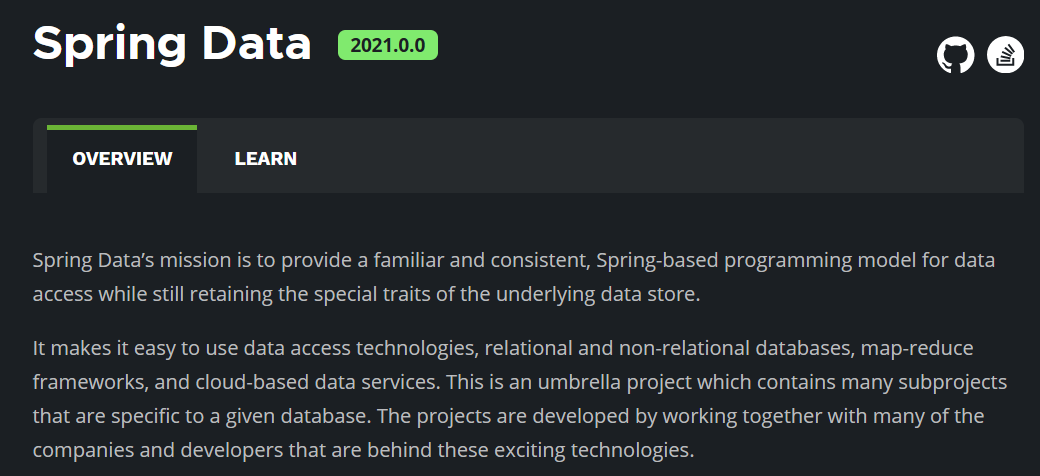
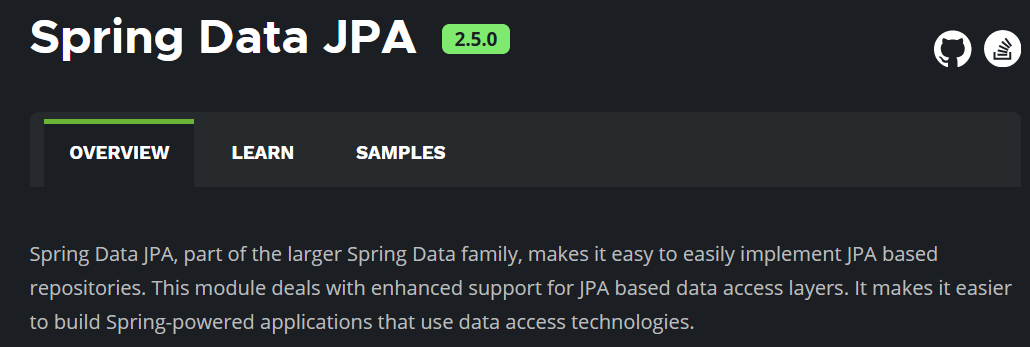
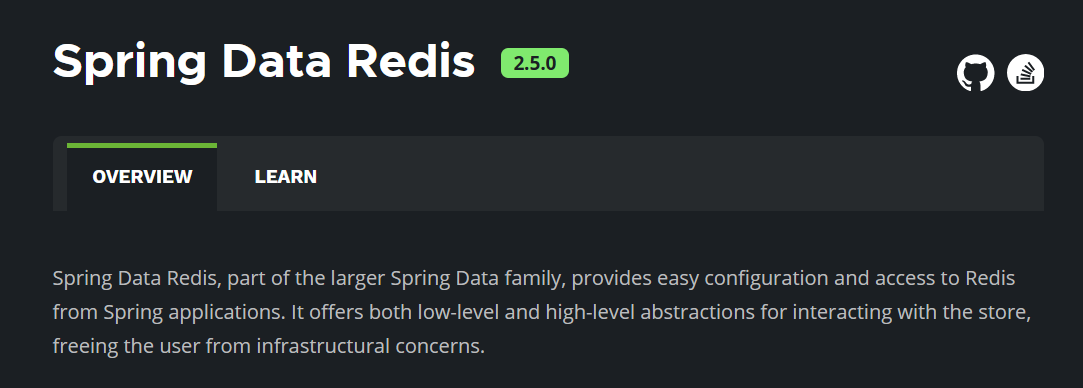
SpringData 第三章 Spring Data JPA(重点)
Spring Data JPA:Spring Data JPA 是 spring data 项目下的一个模块。提供了一套基于 JPA 标准操作数据库的简化方案。底层默认的是依赖 Hibernate JPA 来实现的。 Spring Data JPA 的技术特点:我们只需要定义接口并集成 Spring Data JPA 中所提供的接 口就可以了。不需要编写接口实现类。
一、 创建 Spring Data JPA 项目
1 导入 jar
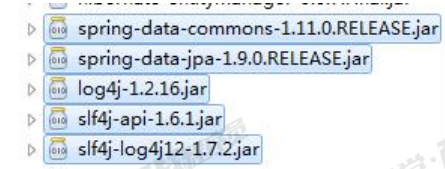
2 修改配置文
<?xml version="1.0" encoding="UTF-8"?> <beans xmlns="http://www.springframework.org/schema/beans" xmlns:xsi="http://www.w3.org/2001/XMLSchema-instance" xmlns:context="http://www.springframework.org/schema/context" xmlns:aop="http://www.springframework.org/schema/aop" xmlns:tx="http://www.springframework.org/schema/tx" xmlns:jpa="http://www.springframework.org/schema/data/jpa" xsi:schemaLocation="http://www.springframework.org/schema/beans http://www.springframework.org/schema/beans/spring-beans.xsd http://www.springframework.org/schema/context http://www.springframework.org/schema/context/spring-context.xsd http://www.springframework.org/schema/aop http://www.springframework.org/schema/aop/spring-aop.xsd http://www.springframework.org/schema/data/jpa http://www.springframework.org/schema/data/jpa/spring-jpa.xsd http://www.springframework.org/schema/tx http://www.springframework.org/schema/tx/spring-tx.xsd"> <!-- 配置读取 properties 文件的工具类 --> <context:property-placeholder location="classpath:jdbc.properties"/><!-- 配置 c3p0 数据库连接池 --> <bean id="dataSource" class="com.mchange.v2.c3p0.ComboPooledDataSource"> <property name="jdbcUrl" value="${jdbc.url}"/> <property name="driverClass" value="${jdbc.driver.class}"/> <property name="user" value="${jdbc.username}"/> <property name="password" value="${jdbc.password}"/> </bean> <!-- Spring 整合 JPA 配置 EntityManagerFactory--> <bean id="entityManagerFactory" class="org.springframework.orm.jpa.LocalContainerEntityManagerFactoryBe an"> <property name="dataSource" ref="dataSource"/> <property name="jpaVendorAdapter"> <bean class="org.springframework.orm.jpa.vendor.HibernateJpaVendorAdapter"> <!-- hibernate 相关的属性的注入 --> <!-- 配置数据库类型 --> <property name="database" value="MYSQL"/> <!-- 正向工程 自动创建表 --> <property name="generateDdl" value="true"/> <!-- 显示执行的 SQL --> <property name="showSql" value="true"/> </bean> </property> <!-- 扫描实体的包 --> <property name="packagesToScan"> <list> <value>com.bjsxt.pojo</value> </list> </property> </bean> <!-- 配置 Hibernate 的事务管理器 --> <bean id="transactionManager" class="org.springframework.orm.jpa.JpaTransactionManager"> <property name="entityManagerFactory" ref="entityManagerFactory"/> </bean> <!-- 配置开启注解事务处理 --> <tx:annotation-driven transaction-manager="transactionManager"/><!-- 配置 springIOC 的注解扫描 --> <context:component-scan base-package="com.bjsxt"/> <!-- Spring Data JPA 的配置 --> <!-- base-package:扫描 dao 接口所在的包 --> <jpa:repositories base-package="com.bjsxt.dao"/> </beans>
3 编写 Dao
public interface UsersDao extends JpaRepository<Users, Integer> { //第一个参数对象,第二个参数主键类型 }
4 编写测试代
@RunWith(SpringJUnit4ClassRunner.class) @ContextConfiguration("classpath:applicationContext.xml") public class UsersDaoImplTest { @Autowired private UsersDao usersDao; /** * 添加用户 */ @Test @Transactional// 在测试类对于事务提交方式默认的是回滚。 @Rollback(false)//取消自动回滚 public void testInsertUsers(){ Users users = new Users(); users.setUserage(24); users.setUsername("张三"); this.usersDao.save(users); } }
二、 Spring Data JPA 的接口继承结
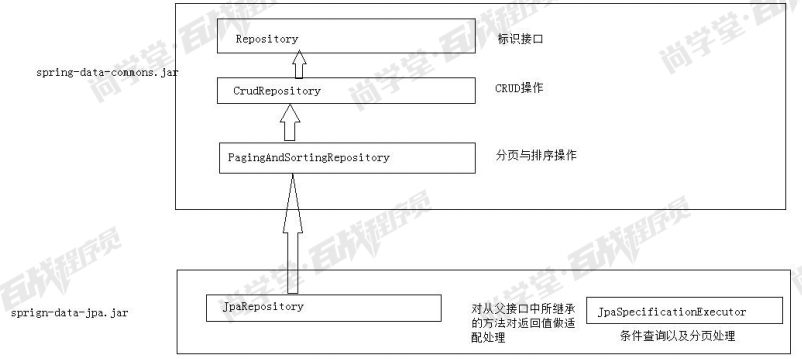
三、 Spring Data JPA 的运行
@PersistenceContext(name="entityManagerFactory") private EntityManager em; @Test public void test1(){ //org.springframework.data.jpa.repository.support.SimpleJpaRepositor y@fba8bf //System.out.println(this.usersDao); //class com.sun.proxy.$Proxy29 代理对象 是基于 JDK 的动态代理方式 创建的 //System.out.println(this.usersDao.getClass()); JpaRepositoryFactory factory = new JpaRepositoryFactory(em); //getRepository(UsersDao.class);可以帮助我们为接口生成实现类。而 这个实现类是 SimpleJpaRepository 的对象 //要求:该接口必须要是继承 Repository 接口 UsersDao ud = factory.getRepository(UsersDao.class); System.out.println(ud); System.out.println(ud.getClass()); }
四、 Repository 接口
Repository 接口是 Spring Data JPA 中为我我们提供的所有接口中的顶层接口
Repository 提供了两种查询方式的支持
1)基于方法名称命名规则查询
2)基于@Query 注解查询
1 方法名称命名规则查询 规则:findBy(关键字)+属性名称(属性名称的首字母大写)+查询条件(首字母大写)
1.1创建接口
/** * Repository 接口讲解 * @author Administrator * */ public interface UsersDao extends Repository<Users, Integer> { List<Users> findByUsernameIs(String string);List<Users> findByUsernameLike(String string); List<Users> findByUsernameAndUserageGreaterThanEqual(String name,Integer age); }
1.2测试类
/** * Repository 接口测试 * @author Administrator * */ @RunWith(SpringJUnit4ClassRunner.class) @ContextConfiguration("classpath:applicationContext.xml") public class RepositoryTest { @Autowired private UsersDao usersDao; /** * 需求:使用用户名作为查询条件 */ @Test public void test1(){ /** * 判断相等的条件,有三种表示方式 * 1,什么都不写,默认的就是做相等判断 * 2,Is * 3,Equal */ List<Users> list = this.usersDao.findByUsernameIs("王五"); for (Users users : list) { System.out.println(users); } } /** * 需求:根据用户姓名做 Like 处理 * Like:条件关键字 */ @Test public void test2(){List<Users> list = this.usersDao.findByUsernameLike("王%"); for (Users users : list) { System.out.println(users); } } /** * 需求:查询名称为王五,并且他的年龄大于等于 22 岁 */ @Test public void test3(){ List<Users> list = this.usersDao.findByUsernameAndUserageGreaterThanEqual("王五", 22); for (Users users : list) { System.out.println(users); } } }
2 基于@Query 注解的查询
2.1通过 JPQL 语句查询
JPQL:通过 Hibernate 的 HQL 演变过来的。他和 HQL 语法及其相似。
2.1.1创建接口
/** * Repository 接口讲解 * @author Administrator * */ public interface UsersDao extends Repository<Users, Integer> { //方法名称命名规则 List<Users> findByUsernameIs(String string); List<Users> findByUsernameLike(String string); List<Users> findByUsernameAndUserageGreaterThanEqual(String name,Integer age); //使用@Query 注解查询 @Query(value="from Users where username = ?") List<Users> queryUserByNameUseJPQL(String name);@Query("from Users where username like ?") List<Users> queryUserByLikeNameUseJPQL(String name); @Query("from Users where username = ? and userage >= ?") List<Users> queryUserByNameAndAge(String name,Integer age); }
2.1.2测试类
/** * 测试@Query 查询 JPQL */ @Test public void test4(){ List<Users> list = this.usersDao.queryUserByNameUseJPQL("王五 "); for (Users users : list) { System.out.println(users); } } /** * 测试@Query 查询 JPQL */ @Test public void test5(){ List<Users> list = this.usersDao.queryUserByLikeNameUseJPQL(" 王%"); for (Users users : list) { System.out.println(users); } } /** * 测试@Query 查询 JPQL */ @Test public void test6(){ List<Users> list = this.usersDao.queryUserByNameAndAge("王五", 22); for (Users users : list) {System.out.println(users); } }
2.2通过 SQL 语句查询
2.2.1创建接口
/** * Repository 接口讲解 * @author Administrator * */ public interface UsersDao extends Repository<Users, Integer> { //方法名称命名规则 List<Users> findByUsernameIs(String string); List<Users> findByUsernameLike(String string); List<Users> findByUsernameAndUserageGreaterThanEqual(String name,Integer age); //使用@Query 注解查询 @Query(value="from Users where username = ?") List<Users> queryUserByNameUseJPQL(String name); @Query("from Users where username like ?") List<Users> queryUserByLikeNameUseJPQL(String name); @Query("from Users where username = ? and userage >= ?") List<Users> queryUserByNameAndAge(String name,Integer age); //使用@Query 注解查询 SQL //nativeQuery:默认的是 false.表示不开启 sql 查询。是否对 value 中的语句 做转义。 @Query(value="select * from t_users where username = ?",nativeQuery=true) List<Users> queryUserByNameUseSQL(String name); @Query(value="select * from t_users where username like ?",nativeQuery=true) List<Users> queryUserByLikeNameUseSQL(String name); @Query(value="select * from t_users where username = ? and userage >= ?",nativeQuery=true)List<Users> queryUserByNameAndAgeUseSQL(String name,Integer age); }
2.2.2测试类
/** * 测试@Query 查询 SQL */ @Test public void test7(){ List<Users> list = this.usersDao.queryUserByNameUseSQL("王五"); for (Users users : list) { System.out.println(users); } } /** * 测试@Query 查询 SQL */ @Test public void test8(){ List<Users> list = this.usersDao.queryUserByLikeNameUseSQL(" 王%"); for (Users users : list) { System.out.println(users); } } /** * 测试@Query 查询 SQL */ @Test public void test9(){ List<Users> list = this.usersDao.queryUserByNameAndAgeUseSQL(" 王五", 22); for (Users users : list) { System.out.println(users); } }
3 通过@Query 注解完成数据更新
3.1创建接口
@Query("update Users set userage = ? where userid = ?")
@Modifying //@Modifying 当前语句是一个更新语句
void updateUserAgeById(Integer age,Integer id);
3.2测试
/** * 测试@Query update */ @Test @Transactional @Rollback(false) public void test10(){ this.usersDao.updateUserAgeById(24, 5); }
五、 CrudRepository 接口
1 创建接口
/** * CrudRepository 接口讲解 * @author Administrator * */ public interface UsersDao extends CrudRepository<Users, Integer> { }
2 测试代
/** * CrudRepository 接口测试 * @author Administrator * */ @RunWith(SpringJUnit4ClassRunner.class) @ContextConfiguration("classpath:applicationContext.xml")public class RepositoryTest { @Autowired private UsersDao usersDao; /** * 添加单条数据 */ @Test public void test1(){ Users user = new Users(); user.setUserage(21); user.setUsername("赵小丽"); this.usersDao.save(user); } /** * 批量添加数据 */ @Test public void test2(){ Users user = new Users(); user.setUserage(21); user.setUsername("赵小丽"); Users user1 = new Users(); user1.setUserage(25); user1.setUsername("王小虎"); List<Users> list= new ArrayList<>(); list.add(user); list.add(user1); this.usersDao.save(list); } /** * 根据 ID 查询单条数据 */ @Test public void test3(){ Users users = this.usersDao.findOne(13); System.out.println(users);} /** * 查询全部数据 */ @Test public void test4(){ List<Users> list = (List<Users>)this.usersDao.findAll(); for (Users users : list) { System.out.println(users); } } /** * 删除数据 */ @Test public void test5(){ this.usersDao.delete(13); } /** * 更新数据 方式一 */ @Test public void test6(){ Users user = this.usersDao.findOne(12); user.setUsername("王小红"); this.usersDao.save(user); } /** * 更新数据 方式二 */ @Test @Transactional @Rollback(false) public void test7(){ Users user = this.usersDao.findOne(12);//持久化状态的 user.setUsername("王小小"); } }
六、 PagingAndSortingRepository 接口 1 分页处理
1.1创建接口
/** * PagingAndSortingRepository 接口讲解 * @author Administrator * */ public interface UsersDao extends PagingAndSortingRepository<Users, Integer>{ }
/** * CrudRepository 接口测试 * @author Administrator * */ @RunWith(SpringJUnit4ClassRunner.class) @ContextConfiguration("classpath:applicationContext.xml") public class RepositoryTest { @Autowired private UsersDao usersDao; /** * 分页 */ @Test public void test1(){ int page = 2; //page:当前页的索引。注意索引都是从 0 开始的。 int size = 3;// size:每页显示 3 条数据 Pageable pageable= new PageRequest(page, size); Page<Users> p = this.usersDao.findAll(pageable); System.out.println("数据的总条数:"+p.getTotalElements());System.out.println("总页数:"+p.getTotalPages()); List<Users> list = p.getContent(); for (Users users : list) { System.out.println(users); } } }
2 排序的处理 2.1测试代码
/** * 对单列做排序处理 */ @Test public void test2(){ //Sort:该对象封装了排序规则以及指定的排序字段(对象的属性来表示) //direction:排序规则 //properties:指定做排序的属性 Sort sort = new Sort(Direction.DESC,"userid"); List<Users> list = (List<Users>)this.usersDao.findAll(sort); for (Users users : list) { System.out.println(users); } } /** * 多列的排序处理 */ @Test public void test3(){ //Sort:该对象封装了排序规则以及指定的排序字段(对象的属性来表示) //direction:排序规则 //properties:指定做排序的属性 Order order1 = new Order(Direction.DESC,"userage"); Order order2 = new Order(Direction.ASC,"username"); Sort sort = new Sort(order1,order2); List<Users> list = (List<Users>)this.usersDao.findAll(sort); for (Users users : list) { System.out.println(users); } }
七、 JpaRepository 接口
JpaRepository 接口是我们开发时使用的最多的接口。其特点是可以帮助我们将其他接口 的方法的返回值做适配处理。可以使得我们在开发时更方便的使用这些方法
1 创建接
/** * JpaRepository 接口讲解 * @author Administrator * */ public interface UsersDao extends JpaRepository<Users, Integer>{ }
2 测试代码
/** * JpaRepository 接口测试 * @author Administrator * */ @RunWith(SpringJUnit4ClassRunner.class) @ContextConfiguration("classpath:applicationContext.xml") public class RepositoryTest { @Autowired private UsersDao usersDao; /** * 查询全部数据 */ @Test public void test1(){ List<Users> list = this.usersDao.findAll(); for (Users users : list) { System.out.println(users); } } }
八、 JpaSpecificationExecutor 接口 完成多条件查询,并且支持分页与排序
1 单条件查询
1.1创建接口
/** * JpaSpecificationExecutor 接口讲解 * @author Administrator *注意:JpaSpecificationExecutor<Users>:不能单独使用,需要配合着 jpa 中的 其他接口一起使用 */ public interface UsersDao extends JpaRepository<Users, Integer>,JpaSpecificationExecutor<Users>{ }
/** * JpaRepository 接口测试 * @author Administrator * */ @RunWith(SpringJUnit4ClassRunner.class) @ContextConfiguration("classpath:applicationContext.xml") public class RepositoryTest { @Autowired private UsersDao usersDao; /** * 需求:根据用户姓名查询数据 */ @Test public void test1(){ Specification<Users> spec = new Specification<Users>() { /** * @return Predicate:定义了查询条件 * @param Root<Users> root:根对象。封装了查询条件的对象* @param CriteriaQuery<?> query:定义了一个基本的查询.一般不 使用 * @param CriteriaBuilder cb:创建一个查询条件 */ @Override public Predicate toPredicate(Root<Users> root, CriteriaQuery<?> query, CriteriaBuilder cb) { Predicate pre = cb.equal(root.get("username"), "王五"); return pre; } }; List<Users> list = this.usersDao.findAll(spec); for (Users users : list) { System.out.println(users); } } }
2 多条件查询
2.1给定查询条件方式一
/** * 多条件查询 方式一 * 需求:使用用户姓名以及年龄查询数据 */ @Test public void test2(){ Specification<Users> spec = new Specification<Users>() { @Override public Predicate toPredicate(Root<Users> root, CriteriaQuery<?> query, CriteriaBuilder cb) { List<Predicate> list = new ArrayList<>(); list.add(cb.equal(root.get("username"),"王五")); list.add(cb.equal(root.get("userage"),24)); //此时条件之间是没有任何关系的。 Predicate[] arr = new Predicate[list.size()]; return cb.and(list.toArray(arr)); }}; List<Users> list = this.usersDao.findAll(spec); for (Users users : list) { System.out.println(users); } }
2.2给定查询条件方式二
/** * 多条件查询 方式二 * 需求:使用用户姓名或者年龄查询数据 */ @Test public void test3(){ Specification<Users> spec = new Specification<Users>() { @Override public Predicate toPredicate(Root<Users> root, CriteriaQuery<?> query, CriteriaBuilder cb) { return cb.or(cb.equal(root.get("username"),"王五 "),cb.equal(root.get("userage"), 25)); } }; List<Users> list = this.usersDao.findAll(spec); for (Users users : list) { System.out.println(users); } }
3 分页
/** * 需求:查询王姓用户,并且做分页处理 */ @Test public void test4(){ //条件 Specification<Users> spec = new Specification<Users>() { @Overridepublic Predicate toPredicate(Root<Users> root, CriteriaQuery<?> query, CriteriaBuilder cb) { return cb.like(root.get("username").as(String.class), "王%"); } }; //分页 Pageable pageable = new PageRequest(2, 2); Page<Users> page = this.usersDao.findAll(spec, pageable); System.out.println("总条数:"+page.getTotalElements()); System.out.println("总页数:"+page.getTotalPages()); List<Users> list = page.getContent(); for (Users users : list) { System.out.println(users); } }
4 排
/** * 需求:查询数据库中王姓的用户,并且根据用户 id 做倒序排序 */ @Test public void test5(){ //条件 Specification<Users> spec = new Specification<Users>() { @Override public Predicate toPredicate(Root<Users> root, CriteriaQuery<?> query, CriteriaBuilder cb) { return cb.like(root.get("username").as(String.class), "王%"); } }; //排序 Sort sort = new Sort(Direction.DESC,"userid"); List<Users> list = this.usersDao.findAll(spec, sort); for (Users users : list) { System.out.println(users); }}
5 分页与排序
/** * 需求:查询数据库中王姓的用户,做分页处理,并且根据用户 id 做倒序排序 */ @Test public void test6(){ //排序等定义 Sort sort = new Sort(Direction.DESC,"userid"); //分页的定义 Pageable pageable = new PageRequest(2,2, sort); //查询条件 Specification<Users> spec = new Specification<Users>() { @Override public Predicate toPredicate(Root<Users> root, CriteriaQuery<?> query, CriteriaBuilder cb) { return cb.like(root.get("username").as(String.class), "王%"); } }; Page<Users> page = this.usersDao.findAll(spec, pageable); System.out.println("总条数:"+page.getTotalElements()); System.out.println("总页数:"+page.getTotalPages()); List<Users> list = page.getContent(); for (Users users : list) { System.out.println(users); } }
九、 用户自定义 Repository 接口
1 创建接
public interface UsersRepository { public Users findUserById(Integer userid);
}
2 使用接
/** * 用户自定义 Repository 接口讲解 * @author Administrator */ public interface UsersDao extends JpaRepository<Users, Integer>,JpaSpecificationExecutor<Users>,UsersRepository{ }
3 创建接口实现类
public class UsersDaoImpl implements UsersRepository { @PersistenceContext(name="entityManagerFactory") private EntityManager em; @Override public Users findUserById(Integer userid) { System.out.println("MyRepository......"); return this.em.find(Users.class, userid); } }
4 编写测试代
/** * JpaRepository 接口测试 * @author Administrator * */ @RunWith(SpringJUnit4ClassRunner.class) @ContextConfiguration("classpath:applicationContext.xml") public class RepositoryTest { @Autowired private UsersDao usersDao; /*** 需求:根据用户 ID 查询数据 */ @Test public void test1(){ Users users = this.usersDao.findUserById(5); System.out.println(users); } }






【推荐】国内首个AI IDE,深度理解中文开发场景,立即下载体验Trae
【推荐】编程新体验,更懂你的AI,立即体验豆包MarsCode编程助手
【推荐】抖音旗下AI助手豆包,你的智能百科全书,全免费不限次数
【推荐】轻量又高性能的 SSH 工具 IShell:AI 加持,快人一步
· 基于Microsoft.Extensions.AI核心库实现RAG应用
· Linux系列:如何用heaptrack跟踪.NET程序的非托管内存泄露
· 开发者必知的日志记录最佳实践
· SQL Server 2025 AI相关能力初探
· Linux系列:如何用 C#调用 C方法造成内存泄露
· Manus爆火,是硬核还是营销?
· 终于写完轮子一部分:tcp代理 了,记录一下
· 震惊!C++程序真的从main开始吗?99%的程序员都答错了
· 别再用vector<bool>了!Google高级工程师:这可能是STL最大的设计失误
· 单元测试从入门到精通